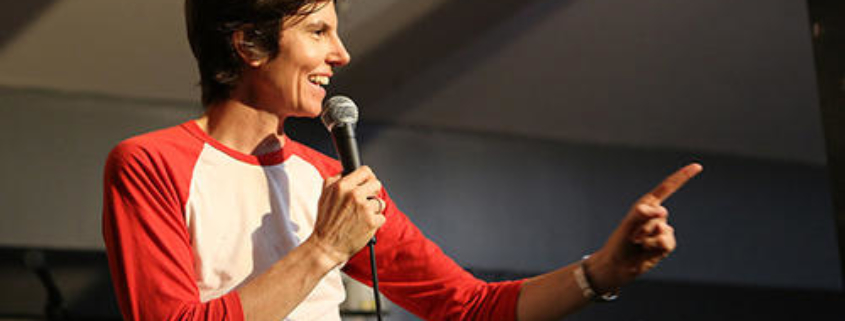This Is (Not) a Laughing Matter
I’m in therapy for an abusive relationship, but I spend most of my weekly fifty-minutes cracking jokes for my psychologist. A few weeks ago she pointed out that I laugh whenever I reveal something that hurt me. “When your boyfriend shoved you, how did you feel?” she asked. “One time I kneed him in the balls. That was rad. That time felt good.” I smiled, evil-laughed—buhaha. According to her, that response missed the point.
This is the way I see it: if we don’t laugh, it’s just sad. I learned that from my father, who was once attacked by a woman with a garden hoe and went on to name this the Crazy Hoe Incident. We don’t laugh to minimize the seriousness of a situation; we laugh to alleviate the pain, make it bearable. Humor is how I rally. It’s how I navigate conversations with my mother when she wants to know why I don’t want to have a bridal shower one day. It’s easier than saying, currently I feel terribly alone, and my self-esteem fluctuates between unreasonably low and totally shot, and frankly I’m not great at relationships (see: therapy). I fear she awaits a marriage that is unlikely to happen. If one reads between the lines of my deflections, they’ll discover vulnerability. The meaning and substance hasn’t changed, only the delivery.
And so, I am a comedy-enthusiast. Netflix curated for me a list of stand-up acts, as I’ve all but given up on movies. On solo-date nights, I treat myself to an improv show at the Upright Citizen’s Brigade. I read books written by comedians. I don’t think of comedy as lowbrow; in fact, I’m offended when humorous authors aren’t accorded the literary world’s approval stamp.
Humor, I believe, is as effective a tool and as difficult a form of expression as anything else. Ultimately, humans seek pleasure, and writers hope to entertain, to arouse and sustain a reader’s interest. We have stories of suffering that must be told, and humor is a viable conduit. Comedy helps readers connect with characters; comedy helps readers swallow uncomfortable or painful truths.
In 2012, comedian Tig Notaro experienced a rough few months that culminated with her walking onstage at the Los Angeles comedy club, Largo, and addressing the packed audience: “Hello. Good evening, hello. I have cancer, how are you?”
The timeline preceding that night went like this: In March, Notaro collapsed while filming the movie, In A World, and at the hospital a doctor discovered her insides were inflamed “beyond recognition.” She tested positively for C. diff, an infection of the intestinal tract that causes bacteria to eat away at its victim’s digestive system.
Notaro was released from the hospital a week before her 41st birthday. On March 24, her mom sang to her in a voicemail and expressed her desire to visit California. Two days later, Notaro received a second voicemail, this time from her stepfather. “Your mother fell last night and it looks like she’s not going to make it.” She didn’t.
On June 24, doctors discovered a lump in Notaro’s breast. She underwent a mammogram and eight days later was diagnosed with stage two cancer that could potentially spread throughout her body. The next night, Notaro performed the standup set at Largo, one Louis C.K. later deemed “truly great [and] masterful.” When Notaro asked the audience of the show whether she should change up her material, quit talking about her dead mother and cancer diagnosis, they responded with a resounding no. “This is awesome,” one man shouted.
Psychologist Alex Lickerman wrote in Psychology Today that humor is often considered a mature defense mechanism (compared to a psychotic, immature, or neurotic one) and helps one endure trauma. Lickerman considers laughter a defense against despair because “it diminishes or even eliminates the moment-by-moment suffering we might otherwise experience as a result of a traumatic loss, which actually makes it more likely we will make it through a trauma unmarred.”
Maybe that’s why David Sedaris jokes in The New Yorker that his sister’s suicide is ultimately inconvenient because “you can’t really say, ‘There used to be six [kids]’… it just makes people uncomfortable.” Or why Nancy Mairs laughs at her handicap in an essay called “On Being a Cripple.” Mairs begins the essay with an incident in which her movements in a bathroom stall unbalanced her, and she fell backward and landed fully clothed, legs splayed on the toilet seat—“the old beetle-on-its-back routine.” Disabilities are hardly a laughing matter, but Mairs’ sense of humor gives readers permission to laugh with her and at their own disadvantages.
Almost two years ago I wrote an opinion editorial about slut-shaming. The topic is a personal one for me. When I was eighteen, my boyfriend told me that he felt ashamed of me because I was a slut—I’d slept with other men before him. Never mind that he’d had four times as many sexual partners. Never mind that he had been unfaithful. “Slut” was thrown around often—to win an argument, to guilt me, to prove his superiority over me—and I spent years apologizing for my sexuality. When I set out to write this particular essay, I understood the gravity of slut-shaming and its effects firsthand, but abuse is heavy and discussing it is difficult. I opted to write comedically, using a man’s Tinder profile that said, “Nice guys don’t like dirty girls,” as my angle into the subject. The use of humor in the essay accomplished two things: there was new distance between me and my painful memories, and the topic of abuse was more accessible for readers.
Standup comedy is not unlike writing prose, in that each comic has a shtick, a persona, similar to that of an author’s distinctive voice. Tig Notaro tells jokes deadpan—she takes her time, lets stories unfold slowly. Opposite of that is a comic like Demetri Martin, who veers away from personal stories and tells joke after joke with little to no build-up. In the comedy special, “My Girlfriend’s Boyfriend,” Mike Birbiglia tells from start to finish the story of his relationship with a girl named Jenny. It’s heartbreaking, as love stories can be, and hilarious, revealing at the end a true change within himself, the narrator.
Had I the know-how, I’d advise you on what works, what doesn’t. I can make suggestions: include an element of surprise or comparisons that create incongruities, follow the rule of three, truth and irony are funny, timing matters significantly, and for whatever reason ‘K’ sounds are funnier than other sounds. But comedy is an imperfect science. The first advice a comedian would offer is this: go to an open mic night. Try out the jokes you found funny—you’re always your first audience—and pay attention to how the crowd responds. Take the jokes to your therapist, keep a journal of every time she leans her head back laughing and slaps her knee.
In a seminar on writing comedically at last December’s residency, Erin Aubry Kaplan concluded with this: “Comedy implies life is a performance. It is meant to be laughed at.” Hear, hear.
Lyndsay Hall lives in Los Angeles where she teaches writing to children and teens. She is pursuing an MFA in Creative Writing at Antioch University and she serves as an editor for Lunch Ticket, Zoetic Press, and Prague Revue. Her essays have appeared in xoJane, Rhizomatic Ideas, and elsewhere.






